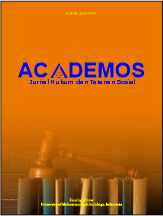Application of Artificial Intelligence Technology in the Eradication of Corruption Criminal Acts in Indonesia
DOI:
https://doi.org/10.30651/aca.v1i1.13958Abstract
Countries in the world are currently moving towards  to the development of sophisticated intelligent automated systems including the State of Indonesia where this system is able to achieve digital transformation which is considered as one of the most important pillars of modern economic growth.  With the PBB's call to implement the 2030 sustainable development plan, right in the context of this transformation, countries including Indonesia are trying to utilize modern technology in combating many issues that haunt society, namely corruption. The researcher will answer the questions (1) The legitimacy of the use of AI by the KPK in the Eradication of Corruption in Indonesia (2) The ideal legal mechanism to accommodate the use of artificial intelligence technology in eradicating corruption in Indonesia. This research uses a sociolegal approach. The results in this study indicate that in the legitimacy of the KPK in eradicating corruption criminal acts by using artificial intelligence products for eradicating corruption criminal acts, there are several articles that can be reviewed that the importance of the KPK is to use technology products in eradicating corruption criminal acts and the use of technology in handling evidence collection. and strengthen the evidence that states the existence of  corruption actsReferences
Prakasa, S. U. W. (2019). ANTI-CORRUPTION SURVIVOR , ACADEMIC FREEDOM , AND THE. Petita: Jurnal Kajian Ilmu Hukum Dan Syariah, 4(2), 163–173.
Surden, Harry, (2019). Artificial Intelligence and Law: An Overview, 35 GA, ST. U.L.REV
Eddyono, Supriyadi Widodo. (2014) Mengurai Pengaturan Penyadapan dalam Rancangan KUHAP. Jurnal Teropong. Vol. 1.
RZK. Aturan Penyadapan, Perlindungan atau Ancaman Bagi Pengguna Telekomunikasi, http://www.hukumonline.com/berita/baca/lt4b34d3deb69c6/penyadapan, diakses pada tanggal 20 Mei 2022.
Oxford Insight, and C Minds. 2018. Toward an AI Strategy in Mexico : Harnessing the AI Revolution. White Paper, C Minds, Oxford Insight
Alcázar, F., and Kaiser, M. 2019. Un nuevo Blog, Instituto Mexicano para la Competitividad A.C, Mexico City.
Bard, I., and Armstrong, H. 2019. Mapping Global Approaches to AI Governance. Nesta Blog
Rimbawa. Artha. 2021. Kewenangan KPK Dalam Memeberantas Tindak Pidana Korupsi . Vol. 15 No. 2 Desember 2021 : jurnal yustitia
Dávid, Barret, E. And Fazekas, M. 2020. The unintended consequences of anti-corruption messaging in Nigeria: Why pessimists are always disappointed. SOAS ACE working paper
Baack, S. 2016. What big data leaks tell us about the future of jornalism and its past. Internet policy review
R. Widyono. 2005. Pemberantasan Tindak Pidana Korupsi . pg. 78
Vieira. Judivan. J. 2018. Encyclopedia Corruption In The World : Legal Perspective of Corruption. Author House : Los Angeles. Pg. 137
Downloads
Published
Issue
Section
License
Copyright (c) 2022 ACADEMOS Jurnal Hukum dan Tatanan Sosial

This work is licensed under a Creative Commons Attribution 4.0 International License.






